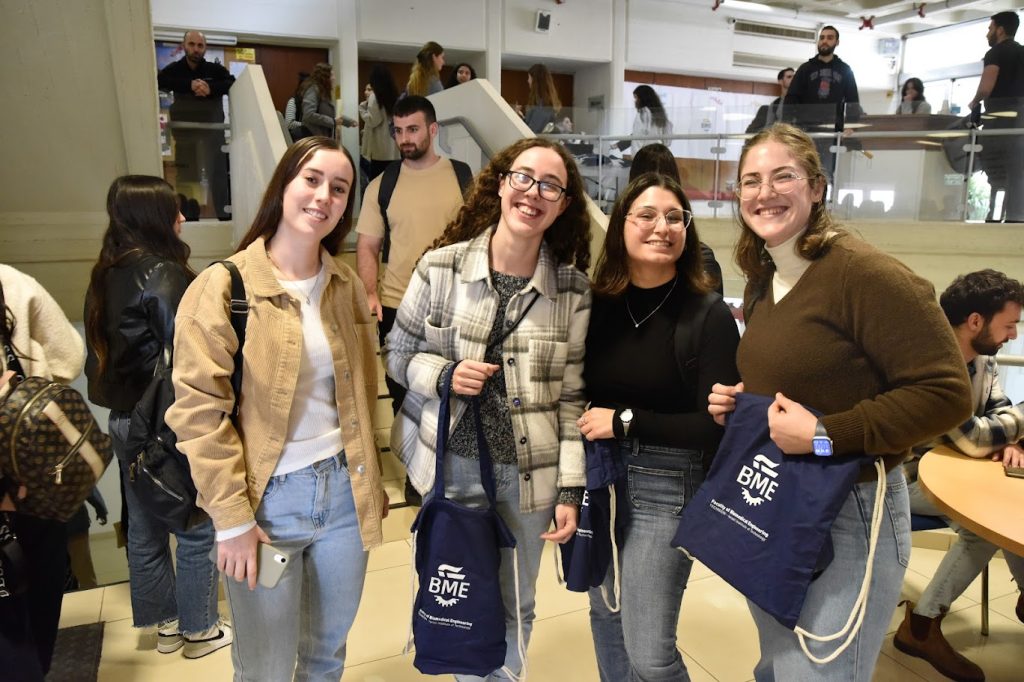Opening of New Academic Year
The Technion opens the new academic year with unprecedented support systems for reservists and for all students.
President of the Technion: “Opening the academic year is our response to attempts to undermine our lives.” More than 15,000 students will study at the Technion this year. The academic year was delayed out of consideration for students serving in the reserves.
The Technion will kick off the new academic year on Sunday, January 14, 2024, with 2,070 new undergraduate students, 48% of whom are women, and 1,029 new students pursuing advanced degrees, 40% of whom are women. The overall student body will total 15,000 students this year, including 10,745 undergraduate students, around 3,000 graduate students and 1,400 doctoral students. The youngest are not yet 18 years old, and the oldest is 76.
As in past years, the Faculties with the largest number of new undergraduate students are those relevant to high-tech professions: the Viterbi Faculty of Electrical and Computer Engineering, the Taub Faculty of Computer Science, and the Faculty of Data and Decision Sciences. The Faculty of Civil and Environmental Engineering is also one of the large Faculties for which there is high demand.
This year, there are more scholarships for research students pursuing advanced degrees, and the number of international students continues to grow steadily. Despite concerns about the difficult security situation in Israel, students from 11 different countries are beginning their studies at the Technion. They come from England, Argentina, the U.S., Ethiopia, India, China, Mexico, the Philippines, Canada, Russia, and Turkey. Eighty advanced-degree students will begin studying at the Jacobs Technion–Cornell Institute in New York and 17 new students will begin studying at the Guangdong Technion–Israel Institute of Technology in China.
“Together with the entire country, the Technion suffered a terrible and painful blow,” said Prof. Uri Sivan, president of the Technion. “Dozens of our community’s family members were murdered on October 7th and others were taken hostage. Many were wounded or killed in battle, and we are distraught and deeply pained.” The President explained that “we are opening the academic year because that has always been and remains our response to every attempt to disrupt our lives. We will continue to educate our students with the values that guided us during the last 100 turbulent years: tolerance, inclusion, and a commitment to truth and justice. We will continue to support the security and economy of the State of Israel, and no less importantly, we will continue to be committed to Israeli society out of a deep social responsibility towards all its citizens. The Technion has a long tradition of coexistence among all the communities on campus and we are determined to preserve this way of life. We are facing significant challenges, but based on my familiarity with the strength and resilience of the Technion family, I have no doubt that we will successfully overcome these challenges.”
Technion Senior Executive Vice President Prof. Oded Rabinovitch said, “We have been waiting a long time for students to return to the campus, and the opening of the new academic year is an opportunity for all of us to step up and do whatever we can to help the students adjust. This is a chance for us to pitch in to help those returning from the reserves, as well as those who will continue to serve during the semester and, indeed, all the Technion’s students. We foresee that there will be students who will continue to serve in the reserves after classes begin, and we will support them and make sure that they successfully complete their studies.”
The “Back on Track” program, which the Technion ran for the first time because of the war and its effects, took place during the last two weeks under the leadership of the Dean of Students Office and the Technion Students Association. The program included stress-relieving, recreational workshops and activities prior to returning to the classroom. This unique initiative helped students, especially those who served in the reserves, return to their studies as smoothly as possible, to take a break from the pressure and catch up.
Dean of Students Prof. Ayelet Fishman said, “We are proud of our reservists, and this pride is expressed through an array of steps that we are taking on their behalf. Our students who serve in the reserves do not only deserve our appreciation; they also deserve extensive help upon returning to their studies. Therefore, we have announced a series of academic adjustments and accommodations designed to help them, as well as a significant NIS 6,000 grant to be applied towards payments connected to their studies. These students will be exempt from paying rent on their campus dorm rooms, and they will receive emotional support as well as exemptions from certain exams from last year, among other steps. Like the rest of the country, the relationship between Jews and Arabs has been shaken by the war. As a result, we invested considerable resources to prepare for the students’ return to campus and the rehabilitation of our lives together. We have trained members of our faculty to teach mixed classes, and we have provided preparatory workshops for the dorm staff, as well as joint discussion groups and training for our student mentors – older students who serve as ‘big brothers and sisters’ to new students. We also established a Resilience Center and a telephone hotline to provide emotional and psychological help in Hebrew and Arabic. The entire student support and guidance team, which is part of the broad support network offered by the Office of the Dean of Students, received special training in preliminary therapeutic skills for helping trauma victims, and will operate according to the ‘trauma-aware campus’ model by adapting learning processes and helping ensure academic success.”



